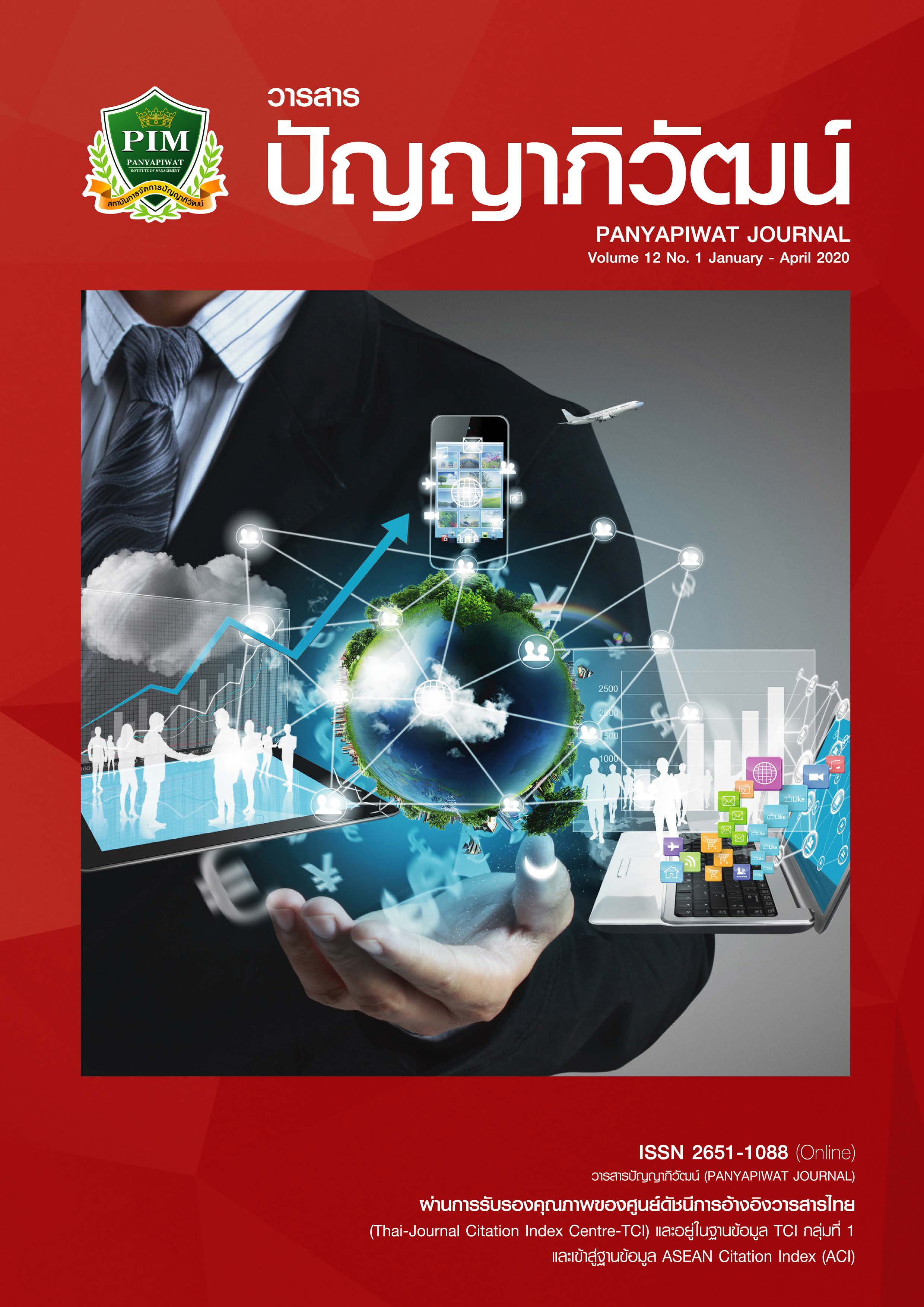รูปแบบการสร้างสมรรถนะการประเมินของผู้บริหารมหาวิทยาลัยระดับต้น: ประยุกต์ใช้แนวคิดชุมชนแห่งการเรียนรู้ทางวิชาชีพ
Main Article Content
บทคัดย่อ
บทความนี้ผู้วิจัยได้นำเสนอการสร้างรูปแบบสมรรถนะการประเมินของผู้บริหารมหาวิทยาลัย ซึ่งมีวัตถุประสงค์เพื่อสำรวจและสร้างรูปแบบสมรรถนะการประเมินของผู้บริหาร โดยผู้วิจัยได้ทำการศึกษาทักษะด้านการประเมินที่หลากหลายและนำมาประยุกต์ร่วมกับแนวคิดชุมชนแห่งการเรียนรู้ทางวิชาชีพเพื่อให้สมรรถนะ การประเมินสามารถวิเคราะห์และแก้ไขปัญหาที่มีความเฉพาะเจาะจงในมหาวิทยาลัยได้ การวิจัยครั้งนี้เป็นการวิจัยแบบผสมผสาน (Mixed method) โดยใช้วิธีการวิเคราะห์เชิงคุณภาพควบคู่กับการวิเคราะห์เชิงปริมาณเพื่อยืนยันผลที่ได้รับ ผลการศึกษาพบว่า องค์ประกอบของรูปแบบการประสร้างสมรรถนะการประเมินสำหรับผู้บริหารประกอบไปด้วย 4 ขั้นตอนคือ ขั้นปัจจัยนำเข้า ขั้นกระบวนการ ขั้นผลผลิต และขั้นข้อมูล โดยมีขั้นดำเนินการ 5 ขั้นตอนย่อยคือ ประชุมรวมกลุ่ม วิเคราะห์ปัญหา ออกแบบกิจกรรม แลกเปลี่ยนการเรียนรู้ และนวัตกรรม ซึ่งต้องดำเนินการอยู่ภายใต้กรอบองค์ประกอบของการสนับสนุนและภาวะผู้นำร่วม การมีเงื่อนไขที่สนับสนุน การเรียนรู้ร่วมกัน และการแลกเปลี่ยนการเรียนรู้ระหว่างบุคคล
Article Details
“ข้าพเจ้าและผู้เขียนร่วม (ถ้ามี) ขอรับรองว่า บทความที่เสนอมานี้ยังไม่เคยได้รับการตีพิมพ์และไม่ได้อยู่ระหว่างกระบวนการพิจารณาลงตีพิมพ์ในวารสารหรือแหล่งเผยแพร่อื่นใด ข้าพเจ้าและผู้เขียนร่วมยอมรับหลักเกณฑ์การพิจารณาต้นฉบับ ทั้งยินยอมให้กองบรรณาธิการมีสิทธิ์พิจารณาและตรวจแก้ต้นฉบับได้ตามที่เห็นสมควร พร้อมนี้ขอมอบลิขสิทธิ์บทความที่ได้รับการตีพิมพ์ให้แก่สถาบันการจัดการปัญญาภิวัฒน์หากมีการฟ้องร้องเรื่องการละเมิดลิขสิทธิ์เกี่ยวกับภาพ กราฟ ข้อความส่วนใดส่วนหนึ่งและ/หรือข้อคิดเห็นที่ปรากฏในบทความข้าพเจ้าและผู้เขียนร่วมยินยอมรับผิดชอบแต่เพียงฝ่ายเดียว”
เอกสารอ้างอิง
Canadian Evaluation Society. (2009). Competencies for Canadian evaluation Practice national council brief professional designation core committee. Retrieved January 15, 2019, from https://evaluationcanada.ca/txt/20090531_compe tencies.pdf
Coryn, C., Noakes, L. A., Westine, C. D. & Schröter, D. C. (2010). A systematic review of theorydriven evaluation practice from 1990 to 2009. American Journal of Evaluation, 32(1), 1-28.
Dechakupt, P. (2000). A Compilation of Innovative Articles to Stimulate Learning for Teachers in the Era of Reform. Bangkok: Faculty of Education, Chulalongkorn University. [in Thai]
Donprasit, S. (2006). Competency of teachers and educational administrators. Thai Journal of Education, 17, 10-21. [in Thai]
Duignan, P. (2002). Building social policy evaluation capacity. Retrieved January 2, 2019, from https://www.msd.govt.nz/publications/journal/19-december-/19-pages179-194.html
Ghere, G., King, J. A., Stevahn, L. & Minnema, J. (2006). A professional development unit for reflecting on program evaluator competencies. American Journal of Evaluation, 27, 108-123.
Hargreaves, A. (2003). Teaching in the knowledge society: Education in the age of insecurity. New York: Teacher College Press.
Harnar, M. A. & Preskill, H. (2007). Evaluators descriptions of process use: an exploratory study, New Directions for Evaluation, 116, 27-44.
Hord, S. M. (1997). Professional Learning Communities: Communities of Continuous Inquiry and Improvement. Retrieved on April 28, 2016, from https://www.sedl.org/siss/plccredit.html
International Board of Standards for Training, Performance and Instruction. (2006). Evaluator competencies. Retrieved June 5, 2019, from https://www.ibstpi.org/Competencies/evaluator
Intrararoon, Ch., Urwongs, S. & Sujiva, S. (2008). The Development of Performance Appraisal System of Governmental Teachers. KKU research journal, 8(4), 63-76. [in Thai]
King, J. A. (2007). Making sense of participatory. New Direction for Evaluation, 114, 83-86.
Kirkhart, KE. (2002). Reconceptualizing evaluation use: An integrated theory of influence. In Caeacelli VJ. And Preskill H. (Eds.). The expanding scope of evaluation use, new directions for evaluation. San Francisco: Jossey-Bass.
Larpmala, S. (2000). The Report of Hong Kong Education. Bangkok: Pimdee. [in Thai]
Louis, K. S. & Kruse, S. D. (1995). Professional and Community: Perspectives on Reforming Urban Schools. Thousand Oaks, CA: Corwin Press.
Moon, C., Lee, J. & Lim, S. (2010). A performance appraisal and promotion ranking system based on fuzzy logic: An implementation case in military organizations. Applied Soft Computing, 10(March), 512-519.
Patton, M. Q. (1997). Utilization-focused evaluation, the new century text (3rd ed.). CA: Sage.
Phosrithong, N. (2007). Competency model for chief of child development center in Local administrative organization, Department of local administration. Ministry of Interior. Research documents, Suan Dusit University. [in Thai]
Sangthong, N. (2004). Let's get to know the Completency. Bangkok: HR Center. [in Thai]
Sergiovanni, T. (1994). Building community in schools. San Francisco, CA: Jossey Bass.
Somerville, I. & Mroz, J. E. (1997). New Competencies for a new world. In F. Hesselbein, M. Goldsmith, & R. Beckhard (Eds.), The organization of the future, 65-78.
Thamromdee, S., Chanin, T. & Traiyawong, K. (2010). The Research and Development of the Community of Learning on Contemplative Education. The Academic Document Project of Learning for Change No.8. Nakhon Pathom: Emy Enterprise Co., Ltd. [in Thai]
Thompson, S. C., Gregg, L. & Niska, J. M. (2004). Professional learning communities, leadership, andstudent learning. Research in Middle Level Education Online, 28(1), 1-15.
Watts, G. D. & Castle, S. (1993). The time dilemma in school restructuring. Phi Delta Kappan, 75(3), 306-310.


